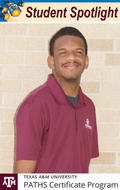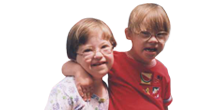Transition
News

2/22/2024
Higher Ed Grants Coming Soon
Aiming to boost college options for Minnesota students with intellectual disability, the Institute on Community Integration's new Inclusive Higher Education Technical Assistance (TA) Center is collaborating with the Minnesota Office of Higher Education as it implements a competitive grant process this spring.

2/16/2024
PATHS Graduate, Daylan Bachik Shares his Transition Experiences on the TEA Website
The Texas Education Agency (TEA) video series captures real-life examples and recommendations for transition planning. In this video, Daylan Bachik shares his story of his successful transition to a career in education. Daylan is a 2023 PATHS graduate, graduating Magna Cum Laude. His chosen track of study was as a Direct Support Professional - Paraprofessional.

1/17/2024
Student Spotlight - Blake Jackson
Meet Blake Jackson, a resilient second-year student in the Direct Support Professional - General (DSP-G) track. As a proud member of the PATHS class 2024 in the fightin' Texas Aggie community, Blake is enrolled in the Postsecondary Access and Training in Human Services (PATHS) Program, where he finds inspiration in Andrey Hepburn's timeless words: "Nothing is impossible, the Word itself says "I'm possible'!".
Events

8th Annual Charting the LifeCourse Showcase

Tuesday, April 23, 2024 - Thursday, April 25, 2024Location: Kansas City, MO
Come together with the network of advocates, families, and professionals to explore how CtLC weaves together personal growth, community engagement, policy advancements, and technological innovations to promote self-determination and good lives for all.
Resources

4/20/2016
Got Transition Anticipates ACP Pediatric to Adult Care Transition Tools
In May this year, the American College of Physicians (ACP) will be releasing new transition readiness/self-care assessment and medical summary tools modeled after Got Transition's "Six Core Elements of Health Care Transition."

12/15/2015
Got Transition Releases New Resources for Young Adults and Health Care Providers
Got Transition has partnered with the Office of Disability Employment (Department of Labor) and the Youth Transitions Collaborative to create a Transition QuickGuide for youth and young adults (ages 12-30), including those with disabilities and chronic health conditions. The QuickGuide includes information and resources about health insurance, self-care management, transition from pediatric to adult health care, decision-making, and career planning to help young people manage their health care needs in order to make their career goals a reality. A related joint letter from ODEP and HRSA's Maternal and Child Health Bureau emphasizes the importance of expanding access to health care services and work-based experiences for youth with chronic health conditions and disabilities.
12/10/2013
Healthcare Transition For Youth With I/DD
A Policy Brief from ASAN
This policy brief addresses the health care needs of autistic youth as they transition to adulthood. The brief, produced by the Autistic Self Advocacy Network (ASAN) and funded by the Special Hope Foundation, provides recommendations to ensure that young adults with Intellectual and Developmental Disabilities (I/DD) receive consistent access to quality health care, as well as support in taking on adult levels of autonomy with respect to their own health care needs. Please direct any inquiries on this resource to Samantha Crane at [email protected].
Mentoring Youth with Disabilities
The Need for Mentoring Youth with Disabilities:Youth with physical or mental disabilities represent special populations at risk for juvenile delinquency, victimization, educational failure, and poor employment outcomes and often have multiple, overlapping risk factors. Such youth can and do benefit from mentoring relationships.
The Need for Inclusive Mentoring Programs:Youth with disabilities typically to receive mentoring within disability-specific programs rather than in inclusive, community-based programs that have a diversity of resources that promote education, job readiness, development of employment skills, and/or training in and exposure to entrepreneurial activities.
The Benefits:
- Youth with disabilities can participate with their typically developing peers in mentoring programs,
- The community capacity to serve people with disabilities would be enhanced with training, technical assistance, and programmatic supports,
- There is a social value to providing inclusive supports and services, and
- Through building the capacity of community-based mentoring programs to serve all youth well-including those with special physical or mental challenges-is more cost-effective than supporting multiple specialty services.
Factsheet:
AUCD has developed a factsheet that provides an overview of mentoring youth with disabilities, and gives examples of promising practices from the AUCD network. Click here: factsheet in PDF ![]()







